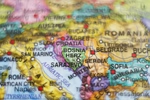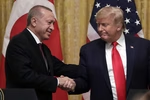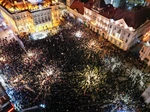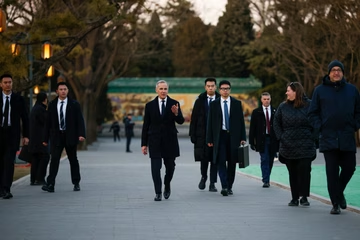
At Wednesday’s House Foreign Affairs Committee Hearing in Washington, D.C., Balkan experts laid out a grim future for Bosnia and the Western Balkans unless the United States and their allies step in and help solve the problems that threaten the peace in the region.
Among a number of problems they listed, the speakers addressed the burning issue of the country’s Election Law which violates the country’s Constitution - which again violates the European Chapter of Human Rights.
Bosnia’s Constitution is part of the Dayton Peace Agreement that ended the 1992-95 war. It can be changed only by the representatives of Bosniaks, Serbs and Croats. But others live in Bosnia too and two of them sued the country for not allowing them to run for President and the Upper House because they are neither Bosniaks, nor Croats nor Serbs. The two are a Roma and a Jew, Dervo Sejdic and Jakob Finci, respectively.
The Human Rights Court in Strasbourg ruled in their favour and ordered Bosnia to fix its Constitution so it does not violate minority rights – the rights of those who are not mentioned in the Constitution as the only ones who can fill the seats in the country’s three-member Presidency or House of Peoples. The problem was also assessed as an impediment to functionality and democratic development by the Council of Europe’s Venice Commission.
But then a Bosnian Croat politician, Bozo Ljubic, took another case to Bosnia’s Constitutional Court. He complained that the country’s Election Law violates the Constitution. It violates the constitutional rights of the constituent peoples (the Serbs, Croats, and Bosniaks) guaranteed by the Dayton Accords to choose their own representatives.
Numbers brought the problem to light. Because there are more than 1.7 million Bosniaks and only little more than half a million Croats in the sub-state the two share, Bosniaks can easily elect the Croat representatives in the country’s Presidency and Upper House as well, which already happened twice.
The Constitutional Court has to stick to the constitution and could only rule in Ljubic’s favour and request the Parliament to fix this issue by May. If not, the October election could be declared invalid.
However the remedy would require the country to move away even more from the ‘one citizen – one vote’ concept. It would have to allow each of the three groups in Bosnia to vote only for representatives of their own group, again leaving the minorities with no chance to ever hold certain top positions.
In essence, if the Parliament implements the European Court’s ruling, it will violate Bosnia’s Constitution even more. If it implements the country’s Constitutional Court’s ruling, it will continue to violate the European Human Rights Convention and jeopardize its path toward EU membership.
“To ensure that election results can be implemented, Bosnia and Herzegovina’s political establishment must find compromises that balance the collective rights of Bosnia and Herzegovina's three constituent peoples (Bosniaks, Croats, and Serbs) with the individual rights of all citizens of Bosnia and Herzegovina, both of which are enshrined in the constitution,” Kurt W. Bassuener, Co-Founder and Senior Associate of the Democratization Policy Council, said at the House Foreign Affairs Committee Hearing.
The EU insists on the constitution to be changed, but that is unlikely as long as people like the Bosnian Serb leader Milorad Dodik and his Croat counterpart, Dragan Covic, are on the political stage. Both are advocating further dissolution of the country along ethnic lines, the experts said.
“At its root, the issue at hand is not a question of “Croat rights” or “constituent peoples” representation, but rather one deeper incumbency burrowing and self-protection of entrenched elites; a manifestation of a far broader, deeper, and longer-running problem,” Bassuener said.
“While there is no shortage of culpability among the full spectrum of BiH political elites, the fact remains that the alliance between Dodik and Croat Democratic Union of Bosnia and Herzegovina (HDZ BiH) leader Dragan Covic has steadily subverted all the progress achieved in the first decade after the war (at massive taxpayer cost) with the aim of effectively carving out more secure feudal fiefdoms of absolute control, ultimately leading to state collapse – which could not be peaceful under any foreseeable circumstances,” he said.
Senior Fellow and Director of the Mediterranean Basin, Middle East, and Gulf Initiative Center for Transatlantic Relations, Sasa Toperic, laid out what could happen if this issue is not resolved before elections. The October 2018 election results will be invalid, the country will not be able to pass laws, including a law to fix this crisis, and the only part of the country that will have a government, will be Republika Srpska, Bosnia's Serb-dominated sub-state entity, he said.
“Its leader, Milorad Dodik is a close ally of Vladimir Putin, has been sanctioned by the United States, and has regularly called for Republika Srpska to secede from the rest of Bosnia and Herzegovina – this crisis may give him that excuse,” Toperic said.
The path to NATO and the EU will be closed and Russia will be able to take advantage of this instability to push its own agenda, he said, adding that all of this would allow Islamic extremists to use lawless Bosnia as a transit route and base of operations.
On the top of all of that, neighboring Croatia and Serbia are making things worse, Bassuener said.
“The escalating challenge to Bosnia’s sovereignty and integrity that we have witnessed over the past decade or so has brought out the worst in both Belgrade and Zagreb, which both are involved in Bosnia’s internal politics to a degree not seen since the war,” Bassuener said. “In fact, all the nationalist agendas unfulfilled during the war, foreign and domestic, are being pursued without restraint.”
The United States must remain focused here because Bosnia and Herzegovina has a “made in America” label on it and “failure in Bosnia and Herzegovina will rightly be seen as an American failure,” he warned.
Kakvo je tvoje mišljenje o ovome?
Učestvuj u diskusiji ili pročitaj komentare





 Srbija
Srbija
 Hrvatska
Hrvatska
 Slovenija
Slovenija



























































